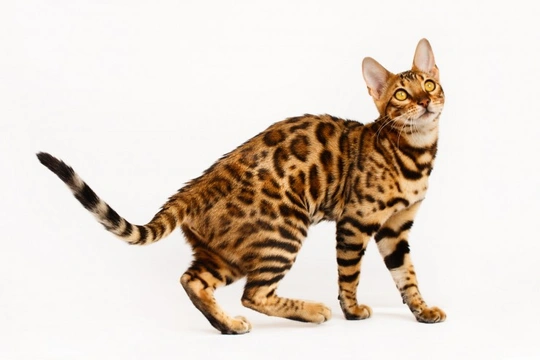
Is it True Bengal Cats Shed less Than Other Cats?
The Bengal is a stunning looking feline that’s taken the cat world by storm. If you’re hoping to share your home with an extraordinary pussy cat and one that’s full of character that does not shed as much as other breeds, the Bengal could be your ideal choice.
The breed is a hybrid that boasts a wild ancestry and being part Asian leopard, they boast a more pelt-like coat than other cats which means they shed differently. With this said some breeders claim a Bengal cat does not shed any fur at all with other breeders owning up to the fact that Bengal cats do shed, but the good news is they shed far less than other breeds.
Pelt-like Coats
The Bengal's pelt-like coat is also quite different to the touch because it feels more silk-like and plush. It also has quite a sheen to it which is magnificently captured when these sleek cats lie or walk in sunlight. It's when their coats really glisten and when their markings are the most striking. The beauty of their pelt-like coat is that is requires very little to no brushing because Bengals take care of themselves by licking their fur in shorter and less frequent self-grooming sessions. Because there is less dried saliva left on their coasts, there tends to be far less dander floating around in the air which makes life a lot easier for anyone who has an allergy to cats.
Are Bengals Really Hypoallergenic?
There is some evidence of the Bengal cat being a hypoallergenic breed with many reports of people not experiencing a reaction when they are around these gorgeous wild-looking pussy cats. It is thought the reason is because there are less microscopic bits of cat dander in the air. Cat dander is made up of dry cat skin mixed together with their dried saliva which is a result of self-grooming. It's the glycoprotein found in dander that's the culprit for causing an allergic reaction rather than the dry skin and it’s found in cat’s saliva and in glands just under their skin.
When people are affected, they typically start sneezing often uncontrollably, their eyes start watering and their noses start to run. On top of this they could break out in a rash or even hives. In very severe cases, a reaction to cat dander can trigger an asthma attack. Although there is no scientific evidence that Bengal cats actually produce less glycoprotein, the fact that many people who typically suffer an allergic reaction do not suffer any symptoms when they are in the company of a Bengal says a lot. However, this is not to say that everyone who is allergic to cats would not suffer some of reaction when they around or petting a gorgeous Bengal cat.
What if a Bengal Starts to Shed a Lot?
It would be fair to say that if a Bengal cat starts to shed and does so excessively it could be cause for concern because they are not known to drop a lot of their coat and as such a trip to the vet could well be in order. When cats start to shed too much of their coat and more especially in specific areas on their bodies, it could be sign there is something a lot more serious going on. If this is the case, the first thing you need to look at is the sort of diet you're feeding your pet. Bengals have quite specific nutritional needs and if there are any deficiencies or excesses in it, this could lead to them suffering from certain digestive disorders which could impact coat condition too.
However, stress and anxiety can have a negative impact on the condition of your pet's coat which could lead to them shedding a lot more than usual too. You would need to take a close look at their environment and see if anything has changed which could be stressing your spotted feline companion out. Once you've established what the problem might be, the next step is to try to put things right so you have a relaxed and happy pussy cat again.
If you cannot find the root cause of the problem, the vet would examine your feline friend and if necessary carry out a few tests before recommending some form of treatment which could include giving them certain supplements and vitamins. Vets often recommend adding omega-3 fatty acids to a cat's diet because it helps maintain a cat's overall health which in turn means a glossier coat, but you should discuss adding any sort of supplement to your pet's food before doing so which allows you to get the dosage right.
Other cat breeds that shed minimally include the following:
- Devon Rex
- Cornish Rex
- Sphynx Cat
- Abyssinian
- American Bobtail
- Bombay
- American Wirehair
- British Shorthair
- American Shorthair
- Chartreux
- LaPerm
- Norwegian Forest
- Selkirk Rex
- American Curl
- Birman
- Balinese
- Burmese
- Burmilla
- Chinese Li Hua
However, there are other breeds that don't shed as much as other cats, but again this does not mean that you would not have an allergenic reaction if you are around any of them. The only way to really find out is to spend a little time with the cat and see what happens before deciding which one would be the best to share your home with.



